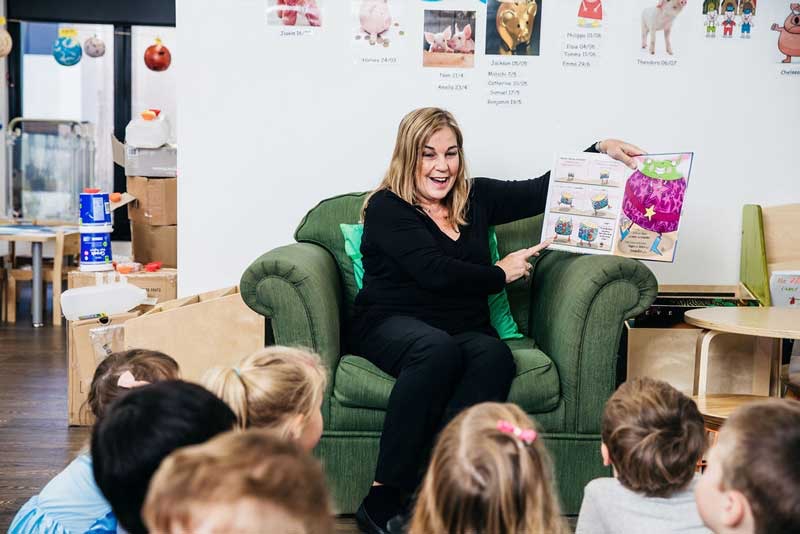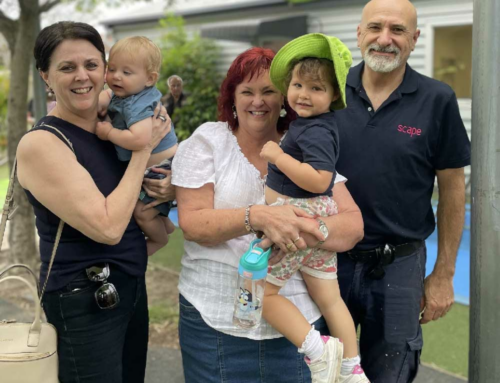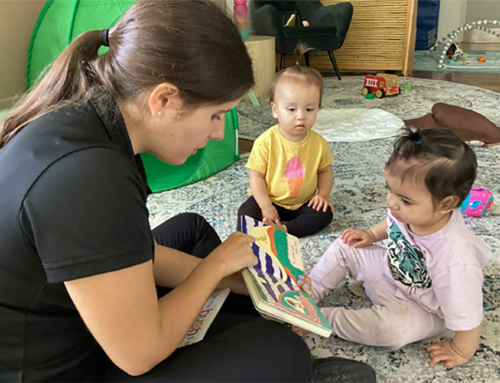How do you talk to preschoolers? Conversational skills don’t come easy, even to adults. However, effective communication is a versatile life skill and teaching preschoolers conversational skills starts with you.
Before we begin, let’s place teaching outside the traditional classroom. Your child is bound to have more fun and success by learning through spontaneous everyday moments and life experiences.
Our article explores easy and practical ways for families to engage their preschooler’s conversational skills at home. We share how to:
- Be a “conversational” role model.
- Ask questions.
- Teach taking turns.
- Use non-verbal communication skills.
- Stay on topic.
- Encourage eye contact.
- Participate in roleplay.
- Read books to initiate conversations.
Children learn conversational skills by observing, interacting and repeating. Being able to connect with other children and adults from a young age will help your child with their development, relationships and wellbeing.

8 Tips for practising conversational skills with your child
Set aside a little time each day to practise preschoolers conversational skills with your child. You can demonstrate these language skills through interactions that you or your child naturally initiates.
-
Be a “conversational” role model.
Young children learn a great deal from watching everyone else around them. You’d be surprised by how much learning they do from observing. You can teach preschoolers conversational skills simply by being a role model and having family conversations:
- About your workday.
- Around the table at breakfast, dinner and lunch.
- While shopping or running errands.
- While doing things around the house or yard.
- On the phone.
- When using a video app to catch up with a distant relative.
They can learn how to start or stop a discussion, how to politely join in a conversation, how to take turns, listen and speak well.

-
Questions are an effective way to engage preschoolers conversational skills.
Asking questions is a rewarding way to show that you are listening and interested in your conversation. Children are naturally curious. They will often ask questions without prompting. Focus on their curiosity within the context of a conversation.
When you’re having a conversation with your child, and they ask you a question, thank them for it. Let them know how good it feels to have their interest.
Equally important is to ask your child questions when they initiate a conversation with you. Asking questions and showing that you’re interested are critical elements when teaching preschoolers conversational skills.
-
Taking turns in conversations.
When practising conversational skills in front of your preschooler, find a good moment to join the conversation by observing visual cues. You can show your child how to join the discussion by:
- Commenting on the topic.
- Sharing a relevant experience.
- Asking a question.
When conversing with your child, you can encourage positive behaviours, like taking turns by using non-verbal communication skills such as nodding when it’s their turn to speak.
Taking turns involves listening and observing for the right cue. If your child interrupts a conversation at the wrong point, it’s okay to tell them to wait. For example, you could say, “Mia, Lilly is still talking. Let her finish and then you can share your thoughts.”

-
Using non-verbal communication skills
Non-verbal communication skills are as important as verbal skills when it comes to teaching preschoolers conversational skills. They include:
- Eye gazing and contact.
- Looking away.
- Reading and using facial gestures.
- Using and understanding hand and body gestures.
Non-verbal skills can provide an indication for when to reply, understanding emotion and how to read between the lines.
-
Staying on topic.
Practising conversational skills, like staying on the same topic, can bolster your child’s confidence when speaking.
For example, perhaps mention that you’re hungry and thinking of dinner. Observe how your child responds. If they divert to a different subject, they were either distracted or not interested in the topic.
Continue the conversation by switching to the new topic your child has raised. Then, try to remain on the same subject by listening and asking questions. See how long you can keep them engaged.
Once the conversation is over, it’s helpful to try to engage your child in the original topic you initiated. For example, you could explain to your child that you began the conversation by asking them about dinner and whether it was time for a meal.
If your child can learn to stay on the topic they originated, the next step is to learn how to show an interest in the discussions others raise.

-
Eye contact games for teaching preschoolers conversational skills
Eye contact is one of the most compelling ways to connect with another person. In addition, learning how to hold eye contact can help improve preschoolers’ conversational skills.
There’s a great children’s game you can play to strengthen your child’s ability to feel comfortable when holding another person’s gaze. It’s called “Don’t blink first”. Of course, you may also know another version, “Don’t look away first.”
Don’t blink first is a simple game and can be played in pairs. To play:
- Stare at each other and try not to blink.
- When the first person blinks or breaks the gaze, the other person wins.
There’s a lot of power behind a stare. In a conversation, a person can use eye contact or other non-verbal skills when talking to engage another person in their topic. Equally, it can show that you are paying attention to the person speaking.

-
Children love to role-play and it’s a useful way to practise conversational skills
Sometimes role-play involves the re-enactment of things that children observed you doing, like talking with other family members. Other times children’s role-play takes them on amazing adventures through their imagination.
Your child’s environment may encourage roleplay and spark playful ideas as they talk out loud to themselves and others. It’s a fabulous way to practice their language skills.
When your child invites you to role-play, you can use the play-based experience to practise conversational skills. Let them lead you on a magical adventure and listen to their interests. The more excited your preschooler is about conversing with you, the greater their learning experience.
As you engage in their playtime, role model your non-verbal skills of eye contact, facial expressions and gestures and integrate other preschool conversational skills, such as staying on topic, taking turns and asking questions.

-
Practising conversations by reading books
Reading books with your child is a valuable way to teach your preschooler conversational skills. While reading to your child, find natural moments to stop and ask your child what they think will happen next.
You can point to the pictures and ask them questions or pause before turning a page to discover what they think might be going on in the mind of one of the characters.
These are great questions to initiate a conversation with an established topic that already holds their interest. They will also help fire up your child’s imagination, making their reading and listening experience more enjoyable.

Get conversational with your child at Petit Early Learning Journey
At Petit ELJ, we firmly believe that every child is a capable learner. We value everyday moments and experiences where they construct their knowledge from the observations and interactions they have with people, places and things.
Our children always come first and we value children and their families as part of our inclusive community. Learn more about how your child can benefit from our unique invitations to play and learn. Visit your nearest Petit ELJ centre for a conversation about your child’s interests and our learning program.






